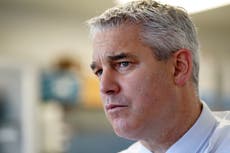Number of cancelled operations ‘doubles in three years due to NHS shortages’
In total, 158,000 operations were called off for non-clinical reasons in 2021-22
Around 30,000 operations were cancelled last year in NHS hospitals in England because of a shortage of staff, new figures show.
Data gathered from freedom of information requests by the Labour Party showed that staff shortages were the most common reason why surgeries did not go ahead for non-clinical reasons.
Some 50 out of 122 acute NHS trusts responded to requests from Labour for details of cancellations over the past year. Extrapolating from these figures, Labour calculated that as many as 158,000 operations are likely to have been called off for non-clinical reasons in 2021-22 – more than double the figure of 79,000 in 2018-19.
Of these, an estimated 10,000 were urgent operations, 2,500 were operations for cancer patients, and 8,000 were surgeries on children. And around one in five of those whose procedures were postponed at the last minute had to wait more than a month for their appointment to be rearranged, according to the party.
But the Department of Health and Social Care (DHSC), headed by Steve Barclay, said it was “misleading” to draw conclusions about overall cancellation numbers on the basis of figures from a proportion of trusts.
Shadow health secretary Wes Streeting said the delays were a result of “crippling workforce shortages in the NHS”. He pointed to the government’s decision to reimpose the 7,500 cap on places at medical schools in England this year after the restriction was lifted in 2020 and 2021.
Mr Streeting said that a Labour government would double the number of places in an effort to train 15,000 new doctors a year, and would also train 10,000 new nurses and midwives and 5,000 new health visitors, while doubling the number of district nurses qualifying each year.
The plans would be paid for by abolishing the non-domiciled tax status, which allows wealthy foreign nationals to avoid paying UK tax while living here.
“Patients are forced to wait longer for vital operations because the Conservatives have failed to train enough staff over the past 12 years,” said Mr Streeting. “Having operations cancelled causes huge disruption to patients and prevents them from being able to get on with their lives.”
He said that the seriousness of the issue was highlighted by the case of a 72-year-old woman in Stoke who had two operations to remove a brain tumour cancelled in September, with the hospital blaming a lack of available beds.
“Labour will tackle this problem at its root. We will train a new generation of doctors and nurses so patients get the treatment they need, when they need it,” said Mr Streeting. “We will abolish non-doms to pay for it because patients need treatment more than the wealthiest need a tax break, and if you live and work in Britain you should pay your taxes here.”
Labour’s information request also found that around 13,000 operations were cancelled in 2021-22 because of a shortage of beds, 5,700 because of equipment failure, 12,600 because of administrative errors, 15,500 because theatre lists overran, 9,500 because an emergency case took priority, and 250 because of adverse weather.
But a DHSC spokesperson said: “Given the response rate from trusts to these FOIs, it is misleading to suggest that 30,000 operations were cancelled due to staffing shortages.
“Thousands of elective appointments and procedures had to be cancelled during the pandemic to protect the NHS, and since then we’ve been focused on delivering the biggest catch-up programme in health history – virtually eliminating the longest two-year waits for treatment.”
Join our commenting forum
Join thought-provoking conversations, follow other Independent readers and see their replies
Comments



Bookmark popover
Removed from bookmarks